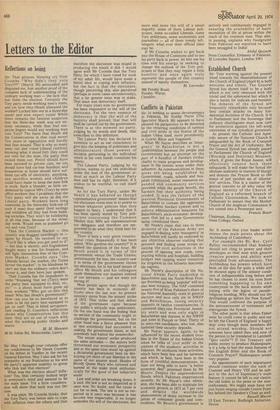Conflicts in Pakistan
Sir: In seeking to assess developments in Pakistan, Mr Kuldip Nayar (The Spectator March 30) appears to have allowed his perspective to be distorted by the recurring conditions of turmoil and civil strife in the States of the Indian Union itself, more prominently in Gujrat, Bihar and Nagaland.
What Mr Nayar describes as 'insurgency' in Baluchistan is not a confrontation between the people and Government but an attempt on the part of a handful of Sardars (tribal chiefs) to resist progress and development in the remote areas under their influence. As communications in these areas are being established by Government, roads, schools and hospitals constructed, water resources expanded and community services provided, while the people benefit, the Sardars feel their authority being eroded. It was the failure of the previous Provincial Governments of Baluchistan to contain the oppressive and obsolete Sardari system and to enforce administrative measures for Baluchistan's socio-economic development that led to a new Government being constituted there.
Mr Nayar's claim that two to three divisions of the Pakistan Army are engaged in dealing with 'insurgency' in Baluchistan will hardly be endorsed by any objective observer visiting that province and finding some troops assisting the civil authorities in the process of opening new roads, constructing schools and hospitals, building bridges and tapping water resources for irrigation in the hitherto inaccessi blemrr Nayar's r's description of the National Awami Party leadership in Baluchistan and the North-West Frontier Province as being 'popular' will not also bear scrutiny. The NAP contested twenty-five of West Pakistan's share of the National Assembly seats in general election and won only six in NWFP and Baluchistan, losing security deposits in twelve constituencies. It contested sixty-one Provincial Assembly seats and won only eight in Baluchistan and thirteen in the NWFP and none in Punjab or Sind. Thirty of its sixty-one candidates, who lost, also forfeited their security deposits. Mr Nayar appears, again, to be influenced by the recent student troubles in the States of the Indian Union when he talks of 'civil strife' in the context of the students' activities in Pakistan. He attributes these activities, which have been few and far between and which, at best, have been in the form of youthful demonstrations, to their not being able to have "a better economic deal" promised them by Mr Bhutto.' Despite the unprecedented floods which Pakistan experienced recently, by Mr Nayar's own admission, she has been able to maintain her economic growth in 1973 at 7 per cent and despite the worldwide phenomenon of sharp increase in the prices of consumer goods and commodities, Mr Bhutto's government is actively and continuously engaged in ensuring the availability of basic necessities of life at prices within the reach of the common man. That also, in passing, explains why foodgrains from Pakistan are reported to have been smuggled to India!
Abdul Qayyum Press Counsellor, Embassy of Pakistan, 35 Lowndes Square, London SW1


































 Previous page
Previous page